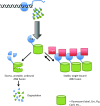Falling apart
- PMID: 27345573
- PMCID: PMC4922843
- DOI: 10.7554/eLife.18203
Falling apart
Abstract
Destabilized nanobodies can be used to deliver fluorescent proteins and enzymes to specific targets inside cells.
Keywords: GFP; HIV-1; antibody engineering; developmental biology; human; mouse; nanobodies; neuroscience; stem cells.
Conflict of interest statement
The authors declare that no competing interests exist.
Figures

Comment on
-
Detection and manipulation of live antigen-expressing cells using conditionally stable nanobodies.Elife. 2016 May 20;5:e15312. doi: 10.7554/eLife.15312. Elife. 2016. PMID: 27205882 Free PMC article.
References
Publication types
MeSH terms
Substances
LinkOut - more resources
Full Text Sources
Other Literature Sources

